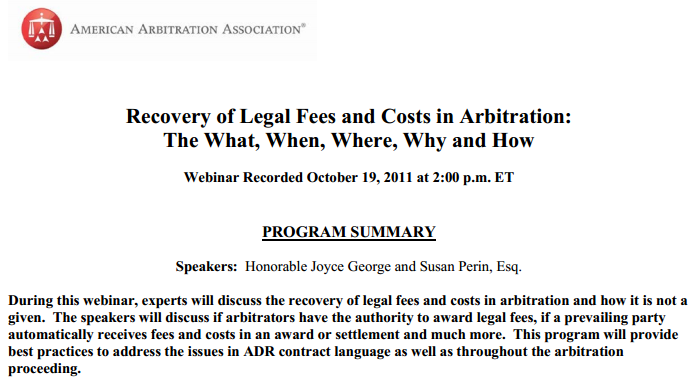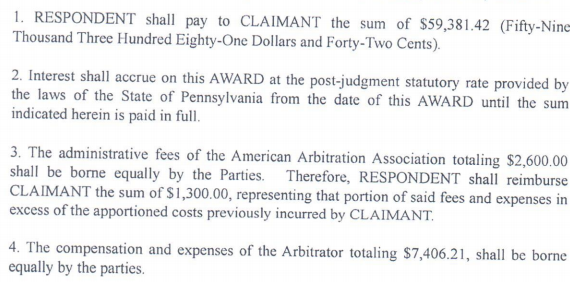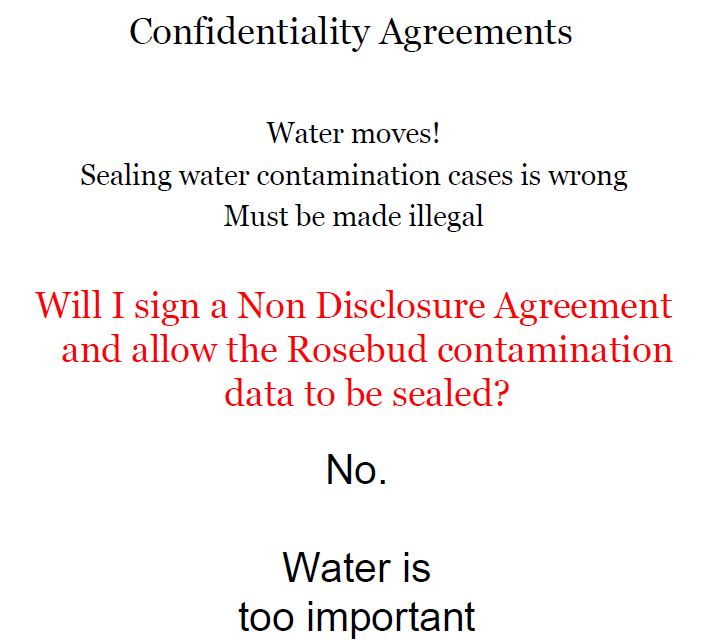
ADR = Alternative Dispute Resolution = Rule of law when it suits them (like Case Management).
The Public (that pays for our courts) is not allowed in to witness ADR.
ADR is misused by AER and the public health harming companies it serves (Alberta’s energy “regulator” is 100% funded by industry). The regulator forces landowners to sign gag orders before they even begin “negotiating” with oil and gas companies about to invade privately owned lands and frac and commingle with undisclosed toxic chemicals near livestock, pets, farms and family homes and into fresh water zones.
It appears ADR by Alberta Court of Queen’s Bench is like AER’s – gag the harmed and keep crimes by law-violating polluters and regulators, etc. hidden from the public, thus enabling continued rape and pillage of families and the public interest “down the street” again and again, just how the oil and gas industry needs it.![]()


![]() Some win, making the frac harmed citizen pay half the costs.
Some win, making the frac harmed citizen pay half the costs.![]()
2017 07 27: Dispute Resolution Reference Guide by Canadian Dept Justice
… V. Disadvantages of arbitration
the success of arbitration is largely dependent on the experience of the arbitrator(s);
arbitral awards are not of legal precedential value;
recourse against an award is very limited;
may not suit disputes involving matters of public law, such as constitutional issues;
time and cost can be significantly affected by a lack of co-operation of the parties or poor process design, or by lack of availability of an arbitrator(s) .
Summary of the Alberta Rules of Court Amendment Regulation by Alberta Courts, March 2020.
Included in the Alberta Rules of Court Amendment Regulation (AR 36/2020), which became effective on March 17, 2020 (with some exceptions), are the following provisions:
…
Rule 4.16 [Dispute resolution processes] is amended to give case conference judges and case management judges the authority to order the parties to participate in an alternative dispute resolution (DR) process. Directions may be provided on any aspect of the dispute resolution process, including the neutral third party, the apportionment of the expense of the DR process, the particulars of when, where and how the process is to be conducted, and the consequences for failing to comply with the judge’s direction. ![]() When it comes to the oil and gas industry in Canada, especially crimes by Encana/Ovintiv, “neutral” and or “independent” parties are extinct, if there ever were any given our racist rape & pillage ways.
When it comes to the oil and gas industry in Canada, especially crimes by Encana/Ovintiv, “neutral” and or “independent” parties are extinct, if there ever were any given our racist rape & pillage ways.![]()
ALTERNATIVE DISPUTE RESOLUTION, CONSENT ORDERS AND APPLICATIONS TO ENFORCE ARBITRATION AWARDS Press Release by Alberta Court of Queen’s Bench, Mar 31, 2020
In the context of the current suspension of hearings except those that are an emergency or urgent, the Court is encouraging counsel and the public to access alternative dispute resolution mechanisms, including mediation and arbitration. These processes will reduce delays in resolving family, civil and commercial disputes in light of the backlog that will seriously challenge timely scheduling of these matters in the Court once the suspension is lifted.
Effective March 30, 2020 the Court will process all Consent Orders resolving any matter over which the Court has jurisdiction, including non-urgent matters and Consent Orders to enforce Mediation or Arbitration Awards, by email or fax in accordance with the Court’s Announcement here.
In light of the current suspension of all but emergency and urgent hearings and until further notice, the following requirements apply to contested applications to the Court to enforce Arbitration Awards pursuant to s.49 of the Arbitration Act:
- The application shall be made in writing, shall include a detailed statement of the reasons that enforcement is claimed to be urgent, and shall be submitted electronically (using the link above).
 There is/was no link in the press release.
There is/was no link in the press release.
- The application shall be made on notice to the person against whom enforcement is sought, in accordance with the Alberta Rules of Court, and shall be supported by the original Arbitration Award or certified copy.
- The application must include a proposed form(s) of Order.
- The Court will deal only with applications which it considers to be urgent, and may only deal with interim enforcement, without a hearing, until COVID-19 restrictions are ended or reduced.
Fraternal Twins: An Overview of Arbitration Law in the U.S. and Canada by Charles B. Rosenberg and Eric Morgan, Dec 17, 2019, Osler, Hoskin & Harcourt LLP  The law firm that represented Encana in Ernst vs Encana.
The law firm that represented Encana in Ernst vs Encana.
Introduction
… This article addresses four important issues that parties doing business in North America should consider when drafting an arbitration clause:
- Whether the arbitration clause is governed by federal or state law (in the U.S.), or federal or provincial law (in Canada);
- Whether the arbitration will be international or domestic;
- Whether institutional or ad hoc rules will apply; and
- The extent to which class actions can be accommodated or excluded.
…
Sources of Law
…
Canada: Like the United States, Canada is a federal system, with parallel federal and provincial arbitration regimes. In contrast to the United States, however, the key legislation governing arbitration in Canada is found primarily at the provincial or territorial – rather than the federal – level. While a federal arbitration statute does exist,[3] it applies only in limited circumstances where at least one of the parties to the arbitration is the Crown, a federal departmental corporation, or a Crown corporation.
The legislation governing Canadian arbitrations is largely the realm of the provinces, which have enacted discrete statutes pertaining to both international and domestic arbitrations.
Each province and territory has adopted legislation applicable to international commercial arbitration between private parties of different countries.[4] With the exception of Quebec, each province and territory has adopted the UNCITRAL Model Law either wholesale or in modified form. In Quebec, Canada’s only civil law jurisdiction, arbitration is governed by the Civil Code of Quebec and the Quebec Code of Civil Procedure.[5]
Domestic arbitrations between two or more Canadian parties fall within a separate legislative regime. In addition to international arbitration statutes, all provinces and territories have adopted separate legislation governing domestic arbitration.[6]
These statutes vary from province to province, particularly on issues such as the validity of contracting out of statutory procedures, the power of courts to stay court proceedings in favor of arbitration, the consolidation of arbitration proceedings, the relationship between mediation and arbitration, and the right to appeal. …
Arbitration Rules
United States: Arbitration rules in the United States ultimately derive from the will of the parties. The FAA provides some foundational rules for arbitration proceedings such as requiring that agreements be in writing,[7] but leaves much of the details to the parties. On numerous occasions, the FAA only prescribes rules when the parties have not agreed on an issue. For example, the FAA outlines a method for choosing arbitrators only in the absence of party agreement.[8] …
In terms of review, the FAA allows courts to vacate an arbitral award only on limited grounds such as “corruption, fraud, or undue means.”[10] …
Canada: The formal requirements to enter into an arbitration agreement in Canada are minimal. Arbitration agreements may be freestanding documents or included as clauses to an existing contract. Legislation governing international arbitrations which incorporate the UNCITRAL Model Law typically require that a binding arbitration agreement be in writing and signed by the parties. The formal requirements for domestic arbitration agreements are found in provincial legislation, which differ between the provinces. For instance, while most provinces require arbitration agreements to be in writing, this is not required under Ontario’s domestic arbitration statute. Canadian courts have long enforced arbitration agreements freely agreed to by the parties. Unless it is clear that the agreement is void, inoperative, or incapable of being enforced, Canadian courts typically defer to the parties’ intent and broadly interpret and enforce arbitration agreements. ![]() Translation: Encana and its enabling regulators and gov’t against one ordinary frac harmed citizen (who must haul safe water to wash hands to try to prevent COVID-19), guaranteeing inability for the citizen to get anywhere except gagged with no public witnesses, no support in the terrifying proceedings and worse, silenced by a judge ordering ADR before the process even begins, just like how AER (100% industry-funded) gags the harmed or about to be harmed). Rule of Law when it suits them.
Translation: Encana and its enabling regulators and gov’t against one ordinary frac harmed citizen (who must haul safe water to wash hands to try to prevent COVID-19), guaranteeing inability for the citizen to get anywhere except gagged with no public witnesses, no support in the terrifying proceedings and worse, silenced by a judge ordering ADR before the process even begins, just like how AER (100% industry-funded) gags the harmed or about to be harmed). Rule of Law when it suits them.![]()
As in the United States, parties to Canadian arbitrations have significant flexibility to choose their own arbitral procedure, including determining the scope of pre-hearing disclosure of documents and other evidence. Provincial statutes for domestic arbitrations establish some default procedural rules, but parties are generally permitted to opt out by selecting their own procedural rules. Depending on the specific legislative provisions, parties may waive procedural and other rights. Under legislation implementing the UNCITRAL Model Law, parties are able to tailor the procedural rules which will govern their arbitration. Arbitrators under the Model Law have broad procedural discretion, including the authority to order parties to produce documents and to request a court’s assistance in taking evidence. Canadian courts have been willing to lend their enforcement powers to facilitate arbitral proceedings, including by ordering witnesses to attend hearings, give evidence, or produce documents. …
Lighting Strike More Likely Than Forced Arbitration Win by Eric Tegethoff, Sept 16, 2019, Public News Service – WA
SEATTLE — Tens of millions of workers and consumers have signed agreements to not sue companies and instead settle through arbitration.
But a new report says they’re more likely to be struck by lightning than to win a case through the so-called forced arbitration process.
The American Association for Justice analyzed data from the two largest arbitration providers between 2014 and 2018 and found that of the 60 million employees subject to forced arbitration, only 282 were awarded monetary damages. Larry Shannon, government affairs director with the Washington State Association for Justice, said the state’s Supreme Court tried to bar these agreements, but the U.S. Supreme Court preempted states in 2018.
“The U.S. Supreme Court drew a road map to give immunity to these corporations by imposing these forced arbitration agreements on individual consumers and workers,” Shannon said.
The AAJ estimates there are 800 million forced arbitration clauses in effect for consumers. However only 6,000 cases are brought forward each year, with consumers winning just an average of 382 of them. Supporters of forced arbitration say it’s easier and less expensive than a trial.
Julia Duncan, senior director of government affairs with the AAJ, said there are two troubling characteristics of the forced arbitration process: corporations choose the arbitration provider, and the proceedings are secretive.
She said “confidentiality” means folks aren’t able to speak out about what happened to them.

“Even more concerning, especially in the context of the #MeToo movement, is that other workers, other consumers aren’t able to find out if other people have had similar experiences,” Duncan said. “And you see this in the cases of sexual harassment.”
Shannon said there are cases when arbitration makes sense. “We fully support arbitration and alternative dispute-resolution measures when they are entered into in a process to resolve a dispute – not before a dispute has ever arisen,” he said.
Last week, the U.S. House Judiciary Committee passed the Forced Arbitration Injustice Repeal Act, which would end this involuntary practice. A vote on the House floor could come as soon as this week.
Court Of Queen’s Bench Of Alberta Lifts Suspension Of The ADR/JDR Rules by Grace Kim, April 29 2019, Mondaq
A notice from the Court of Queen’s Bench of Alberta (March 12, 2019) brings a return of mandatory dispute resolution before trial for civil actions.
On March 12, 2019, the Court of Queen’s Bench of Alberta announced that it will lift the suspension of the ADR/JDR Rules on a one-year pilot project basis. Effective September 1, 2019, the ADR/JDR Rules will be in effect for all civil actions scheduled after that date.
Rules 8.4(3)(a) and 8.5(1)(a) of the Alberta Rules of Court, (otherwise known as the “ADR/JDR Rules”), requiring parties to conduct an Alternate Dispute Resolution (ADR) or a Judicial Dispute Resolution (JDR) before setting a matter for trial, were suspended in July 2013 by former Chief Justice and Associate Chief Justice of the Alberta Court of Queen’s Bench. At that time, limited judicial resources were being stretched beyond capacity and lead times for JDRs were unacceptably long. As such, the suspension of the ADR/JDR Rules was a reasonable response.
How the Pilot Project Will Work
To book a JDR during the pilot period, parties will be required to complete an amended version of Forms 37 or 38, and provide that they “will participate (in lieu of the current wording “have participated”) in at least one of the dispute resolution processes described in R. 4.16(1) to be completed prior to trial”.
This above direction only applies to civil actions.
Parties to family law matters will be exempt from filing Forms 37 or 38 prior to accessing a JDR.
The filing fee will continue to apply. Parties who resolve their action can request reimbursement from the QB Clerk’s office of the portion of the fee paid over and above the basic $600.
What This Means
Lifting the ADR/JDR suspension is meant to encourage parties to attempt alternative means to resolve their disputes without trial. ![]() GAG ‘N SHUT UP!
GAG ‘N SHUT UP!![]() In this regard, the hope is that parties will be enticed
In this regard, the hope is that parties will be enticed ![]() nice word for forced?
nice word for forced?![]() to avoid further delay in later proceeding to trial.
to avoid further delay in later proceeding to trial.
Despite the positives of lifting the ADR/JDR suspension, some concerns remain. One is that it will create a burden on parties who seek to resolve their dispute well in advance of trial, to still be required to comply with the ADR/JDR Rules.
On the other end of spectrum, concerns have been raised in respect of matters where it is clear that ADR/JDRs will be futile. In this regard, it has been suggested that an exit mechanism should be in place to exempt such cases from the ADR/JDR Rules.
The Court has recognized these concerns and directed that parties may apply for an exemption of the ADR/JDR Rules if appropriate, under the guidance of the Rules of Court, as set out below.
Applying for an Exemption
Parties may apply under Rule 4.16(2) for an exemption from the ADR/JDR Rules. There are several grounds upon which a party may be granted an exemption, and applications will be decided on a case-by-case basis. ![]() Translation: If there has been public reporting on your case, or worse, global interest in your case, or the oil company wants to keep their crimes and toxic events secret, to contaminate communities again down the street, you and the public interest are screwed. Case Management took my case backwards, which seems to be its intent. When I tried to get out of it in 2017, the court said no; in 2020, the court offered Encana out
Translation: If there has been public reporting on your case, or worse, global interest in your case, or the oil company wants to keep their crimes and toxic events secret, to contaminate communities again down the street, you and the public interest are screwed. Case Management took my case backwards, which seems to be its intent. When I tried to get out of it in 2017, the court said no; in 2020, the court offered Encana out![]()
In order to facilitate the adjudication of applications for exemptions, the Court of Queen’s Bench will be instituting a system of desk applications with appropriate forms posted on the QB website, along with a Notice to the Profession describing the exemption process before the September 1, 2019 date.
However, it is important to note that the ease of a desk application should not be construed as easily obtaining an exemption to the ADR/JDR Rules. Parties must establish evidence by grounds for making their exemption application.
The Virtually Impossible Task of Obtaining Permission to Appeal Under Section 44(2) of the Alberta Arbitration Act by Lou Cusano, Gino Bruni and Tanis Makowsky, March 6, 2019, ADR Institute of Canada
The Alberta Court of Queen’s Bench has once again confirmed that obtaining permission to appeal an arbitration award under section 44(2) of the Arbitration Act, which applies where an arbitration agreement is silent on an appeal right, will be a virtually impossible task.
Parties wishing to have the option of appealing their arbitration awards to the Alberta courts should therefore be reluctant to rely upon this section and should instead include appeal rights in their arbitration agreements.
As in most Canadian jurisdictions, the framework for appeal of an arbitration award in Alberta depends on the underlying arbitration agreement. Parties can agree that awards may be appealed on questions of law, questions of fact, or questions of mixed fact and law under section 44(1) of the Arbitration Act, RSA 2000, c A-43 (the “Act”). Where the agreement is silent, section 44(2) of the Act provides that, with permission of the Alberta Court of Queen’s Bench, parties can appeal on a question of law.
However, a recent decision of this Court in KBR Industrial Canada Co v Air Liquide Global, 2018 ABQB 257, (“KBR”), confirms yet again that a Section 44(2) appeal is unlikely to succeed.
In fact, there are only a handful of cases where the Courts of Alberta have granted permission to appeal under section 44(2) and of these cases, not one succeeded on appeal.
This is attributable to the stringent requirements for permission to appeal under sections 44(2.1) and 44(3) of the Act, in addition to a public interest requirement imposed in many of the Alberta decisions, including the Court in KBR. Once permission has been granted, there are also difficulties in appealing an arbitral award, but they are outside the scope of this article.
For permission to be granted, a court must first find an extricable question of law, a task that has become increasingly difficult following the determination in Sattva Capital Corp v Creston Moly Corp, 2014 SCC 53, that contractual interpretation is a question of mixed fact and law. In KBR the Court found that it will be a rare circumstance where a question of law can be extricated in the context of an appeal under section 44(2). At issue was the arbitration panel’s interpretation of how two clauses in the agreement that contained the arbitration agreement, a set-off clause and a limitation of liability clause, worked together.
The difference in approaches between the majority and minority of the arbitration panel on this question resulted in a difference in damages of $15 million.
Despite finding an extricable question of law, permission was not granted because of section 44(3), which bars an appeal of any question of law that was expressly before the arbitration panel.
This provision is unique to Alberta and applies to all appeals under the Act unless the parties contract to exclude its application.
Although section 44(3) was dispositive of the permission application in KBR, the Court nevertheless decided to consider whether the additional requirements of section 44(2.1) for permission were met, and ultimately concluded they were not. This section requires first that the importance to the parties of the matters at stake justifies an appeal and second that the determination on the question of law significantly affects the parties.
The Court in KBR started with a review of the jurisprudence, finding that section 44(2.1) creates a “very high standard that most cases will not meet”, requiring “more than a usual impact” that will be “not easily be satisfied”. It noted that while it is “not impossible” to satisfy this standard, it was clear that parties would need to show repercussions more severe or significant than the normal losses that occur as result of an arbitral award.
However, the Court went one step further and applied a public interest test in addition to the section 44(2.1) requirements, pointing to the use of this test by courts in the past. It held that on the facts in KBR, there was no public interest in an appeal because the arbitration panel’s award was unlikely to have a wide-ranging impact on the industrial construction industry generally.
The Court also noted the commercial sophistication of the parties, whose conscious choice in having their contractual disputes determined through a private arbitrator worked as a factor against them in granting permission to appeal in the case.
While a public interest requirement is not unique to Alberta, it is notable that Alberta courts impose this requirement absent statutory language requiring them to do so and despite the fact that section 44(2.1) expressly focuses on the impact to the parties of the arbitration. In contrast, section 31(2)(c) of British Columbia’s Arbitration Act, RSBC 1996, c 55 and section 31(2)(c) of British Columbia’s Commercial Arbitration Act RSBC 1986, c 3, expressly require that the point of law “is of general or public importance”.
Given the KBR Court’s application of the requirements of section 44(2.1), the necessity of a public interest, and the bar on questions of law already considered by an arbitrator under section 44(3), we cannot overstate the difficulty of obtaining permission to appeal under section 44(2).
It appears that this task may be virtually impossible rather than “not impossible”.
The foregoing should sound a caution for commercial parties who wish to have the option to appeal an arbitration award and who rely on section 44(2) to do so. The more prudent approach would be to write an appeal right into their arbitration agreement, such that section 44(1) of the Act applies. Furthermore, parties may wish to consider excluding the application of section 44(3), which can have a very restrictive effect on appeals both under section 44(1) and 44(2) of the Act.
What is Arbitration? by Alberta Arbitration and Mediation Society, undated.
Arbitration
Arbitration involves adjudication by a third-party neutral. ![]() Is neutrality possible in oil polluted and soaked jurisdictions like Alberta?
Is neutrality possible in oil polluted and soaked jurisdictions like Alberta?![]() Most arbitration is designed to be binding. Arbitration will in most instances arise from a pre-existing agreement to go to arbitration in case of a dispute, or it is based on the specific terms of an arbitration agreement entered into after the dispute has arisen. Unless otherwise agreed, the terms of the applicable Arbitration Act will govern.
Most arbitration is designed to be binding. Arbitration will in most instances arise from a pre-existing agreement to go to arbitration in case of a dispute, or it is based on the specific terms of an arbitration agreement entered into after the dispute has arisen. Unless otherwise agreed, the terms of the applicable Arbitration Act will govern.
Arbitration is a process where the parties to a dispute refer it to one or more persons (the “arbitrators”, “arbiters” or “arbitration tribunal”), by whose decision everyone agrees to be bound. It is a resolution technique in which a third party reviews the evidence in the case and imposes a decision that is legally binding for both sides and enforceable.
Arbitration is often used for the resolution of commercial disputes, particularly in the context of commercial and international transactions. The use of arbitration is also frequently employed in consumer and employment matters, where arbitration may be mandated by the terms of employment or commercial contracts.
Arbitration has a number of advantages over litigation, court hearings, and trials. First, it is less adversarial than litigation. The parties in arbitration have the opportunity to fully participate in the proceeding and are more likely to collaborate instead of escalating hostilities, as often happens in litigation. It is also usually cheaper than going to court, simply because the process is faster and less complicated than full litigation.
Arbitration is also more flexible. Parties need not have to wait weeks, or even months to be given a set court date, which cannot be changed for fear of waiting another extended period of time. Arbitration hearings are set around the schedules of the parties, which may even include evenings and weekends.
While the rules of evidence usually apply in arbitration cases, they are not as rigid or complicated. Processes can be negotiated between the arbitrator(s) and the parties to their mutual satisfaction. Arbitration eliminates most of the peripheral steps found in litigation, such as discoveries, interrogatories, requests for documents, and so on. This alone results in considerable savings and lessened hostilities.
Arbitration hearings are usually confidential, and parties can agree to keep the results of the hearing private. This is a considerable advantage over litigation if the matter in dispute is embarrassing or might reveal proprietary information if made public.
Arbitration FAQs
What is Arbitration?
Arbitration is a process where disputing parties agree to present their issue to a neutral arbitrator or panel of arbitrators rather than going to court. The arbitrator, or panel of arbitrators, takes on the role of a private judge and has the authority to resolve the dispute by issuing a final and binding decision.
What can arbitration resolve?
Most contracts for the provision of goods or services contain a clause to address what will happen in the case of disputes. The majority of these clauses specify that, in case of dispute, the parties to the contract will enter into mediation and/or arbitration. Arbitration is particularly effective in most types of contract dispute, disagreements between partners or shareholders, construction issues, insurance claims and wrongful dismissal to name just a few. In fact most civil cases slated to go to court can likely be better arbitrated. ![]() and thus gagged, so as to protect the status quo and keep big brute polluters polluting!
and thus gagged, so as to protect the status quo and keep big brute polluters polluting!![]()


Slide from Ernst presentation at Cochrane, Alberta, 2011
Where are arbitrations held?
Arbitrations can be held in meeting rooms, boardrooms or even in large offices. The exact location for an arbitration hearing can be negotiated by the arbitrator and the disputing parties.
How long does arbitration take?
As you might expect, the obvious answer is that it depends upon the complexity and parameters of each case. As a rule of thumb, count on several months you will need to prepare your case and compile the evidence you wish to present. The actual hearing often ranges from a day to a week. After that, it may take the arbitrator or arbitration panel a month or two to review the facts that were presented and render an award.
How much does arbitration cost?
That, too, depends upon the complexity and length of the arbitration. Depending on their qualifications and expertise, some arbitrators charge $2,000 to $3,000 per day. Others charge considerably less. You might also consider whether you are using a lawyer or an accountant, as well as travel costs and other miscellaneous expenses.
What are my roles and responsibilities in Arbitration?
While arbitration is less confrontational and more informal than litigation, it is still an adversarial process, somewhat similar to going to court. Your roles and responsibilities may vary personally, depending upon whether you engage a lawyer to represent you. Either way, you must to present your case by producing credible evidence and documents that support your argument, call witnesses and make a strong personal appeal to the arbitrator to rule in your favor.
Is Arbitration legally binding?
Yes. When you and the other party agree to arbitration you lose the right to go to court. Arbitration awards are legally binding and generally not appealable.
Is there a maximum or minimum limit to arbitration awards?
No. There are no monetary restrictions on amounts sought or on general damages.
Should I hire a lawyer for arbitration?
Just as some individuals choose to represent themselves in court, you may also choose to represent yourself in arbitration. However, depending upon the complexity of your case and the value of the award being sought, it is often advisable to be properly represented. ![]() What good will lawyers do you if they can fabricate shit with which to quit your case whenever they like? The judicial industry just made things much worse for ordinary Albertans already facing horrific obstacles trying to access near impassible tunnels into and within the legal system.
What good will lawyers do you if they can fabricate shit with which to quit your case whenever they like? The judicial industry just made things much worse for ordinary Albertans already facing horrific obstacles trying to access near impassible tunnels into and within the legal system.![]() You will be responsible for the costs of your own lawyer.
You will be responsible for the costs of your own lawyer.
If I lose in arbitration, will I be responsible for the other party’s costs?
Although it is possible the victorious party will seek costs, it is generally held that each side pays for its own lawyer and expenses while evenly sharing the cost of the arbitrator(s) and peripheral costs such as meals and the meeting room. All of these things are generally discussed and agreed to prior to the start of the arbitration. ![]() How is that possible if a litigant is forced into ADR by a judge?
How is that possible if a litigant is forced into ADR by a judge?![]()
If an arbitration begins, is it too late to negotiate a settlement?
Absolutely not. It is never too late to settle. A negotiated settlement is almost always preferred. In fact many arbitrators are also trained mediators.
If not, you may ask for an independent mediator, you may allow your arbitrator to facilitate settlement negotiations, or your respective lawyers may negotiate for you in confidence. If you and the other party are can reach a mediated agreement your Arbitrator will draft a “Consent Award”, outlining the exact terms of your agreement for everyone’s signature. If attempts at mediation or negotiation are not successful, the arbitration will recommence.
Is arbitration confidential?
Yes. Arbitration is private and not open to anyone except the parties involved. The arbitrator’s final award is also confidential, unless you or the other party have to enforce the award in court, or in rare cases of appeal.

How do I choose an arbitrator?
Both parties must agree to an arbitrator. ![]() If dealing with big oil, gas and frac companies, the little person gets no choice in anything because the big brute always gets what it wants. With this judicial anti-citizen, anti-public interest shit show, it’s a good thing Encana/Ovintiv is going the way of the Dodo, with banks and investors fleeing in every direction.
If dealing with big oil, gas and frac companies, the little person gets no choice in anything because the big brute always gets what it wants. With this judicial anti-citizen, anti-public interest shit show, it’s a good thing Encana/Ovintiv is going the way of the Dodo, with banks and investors fleeing in every direction.![]() In the case of an arbitration panel, each side usually selects an arbitrator, and the two arbitrators then select a third. If you do not know any arbitrators, your lawyer likely will. Also, you can obtain a list of neutral, qualified arbitrators from the ADR Institute of Alberta or the ADR Institute of Canada.
In the case of an arbitration panel, each side usually selects an arbitrator, and the two arbitrators then select a third. If you do not know any arbitrators, your lawyer likely will. Also, you can obtain a list of neutral, qualified arbitrators from the ADR Institute of Alberta or the ADR Institute of Canada.
Alternatively, feel free to contact the AAMS office and someone will be glad to speak with you.
If I do not agree with the arbitrator’s decision, can I appeal?
Generally the arbitrator’s award is final, binding and upheld by the courts. In very rare cases where there was clear bias or negligence on the part of the arbitrator, where there was an error in fact, or where there is new evidence you may ask the arbitrator to reconsider the award, or you may appeal to a court.
Refer also to:
2016: What makes something “Kafkaesque”?
The terrible momentum of the legal system proves unstoppable, even by supposedly powerful officials.
This is a system that doesn’t serve justice, but whose sole function is to perpetuate itself. ![]() Filling many pockets along the way, while emptying yours (and if your case is being watched by people around the world, judges belittling you and lying about you in rulings).
Filling many pockets along the way, while emptying yours (and if your case is being watched by people around the world, judges belittling you and lying about you in rulings).![]()
2016: Chief Justice Beverley McLachlin: key quotes
… “Access to justice in Canada remains a serious problem that imperils the public’s confidence in the justice system,” Chief Justice Beverley McLachlin said in her speech.
